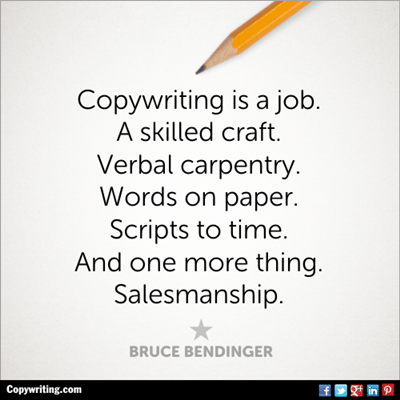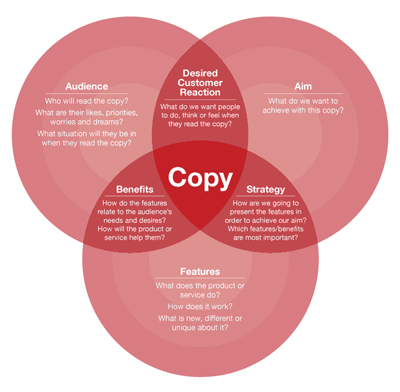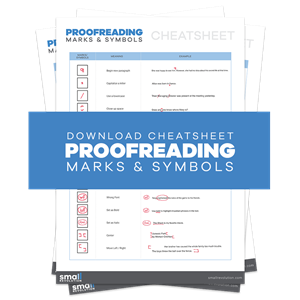Did you know that only about half of all website visitors stay on the page for more than a few seconds?
That’s right. Readers won’t stay around or skim through bland content that doesn’t arouse their interest and engage them.
Your content needs to be captivating, this is where copywriting comes in.
For starters, copywriting refers to creating remarkable online content for marketing and targeting audiences.
Copywriting compels the readers to take a specific action. The ultimate goal is for the consumer to buy a particular product, subscribe to an email list, sign up for some services, or simply contact the business.
Copywriting is an art, and once you’ve captured your audience’s attention, they’re most likely to come back and consume more of your content.
While anyone can become a copywriter, it takes more than writing talent to create remarkable website copy.
Writing talent is a principal requirement for copywriting, but you’ll need to know how to frame your content the right way so that it elicits the proper reaction with your readers. You’re more likely to cause a reaction and make a sale if your content is compelling enough.
Writing persuasively is arguably one of the best skills a copywriter can possess. Unfortunately, schools only teach you spelling and grammar. Writing engaging and compelling content is something you commit yourself to and learn over time.
Fortunately, there are a few copywriting tips that will have you well on your way to writing for the big leagues.
Understand What a Copywriter Truly Does
To become a master of what you’re doing, you need to understand it deeply.
In content marketing, most people cannot draw a clear line between copywriting and regular content writing. However, understanding the difference between the two is a fundamental step towards improving your writing.
As we’ve already mentioned, copywriting is the art of creating compelling content meant for marketing purposes. In copywriting, you need to master the art of persuading your audience to take a specific action by using the right words.

As for regular content writing, you create pages to entertain and engage readers on your website. While this style of writing may make a few sales, marketing is not its primary goal. Therefore, regular content isn’t always as valuable as marketing copy.
Here are a few more ways to tell between the two:
| Copywriting | Regular Content Writing |
|
|
|
|
|
|
|
|
As you can see, copywriting and regular content writing aren’t that far apart from each other. What makes the difference is the core purpose.
The purpose of copywriting is to make sales, while that of regular content writing is to inform.
Write How You Speak
Using your own voice is one of the most essential copywriting tips to improve your skills.
Forget about the unexciting and tedious academic articles you skimmed through in school. While most people might believe that marketing copy needs to be more formal, the opposite is true.
You craft excellent copy when you write the way you talk. Why? Because your target audience needs to feel like they’re having a one-on-one conversation with you.
Always be conversational in your writing. You might feel the need to use industry jargon and academic language to sound like an expert in the matter, but this could cause the opposite effect. Your audience may not be used to reading such heavy content.
Here are a few more tips to ensure you write in a conversational tone:
- Give your words personality
- Always use simple language and steer clear of technical language
- Use contractions where possible. For example, use “it’s” instead of “it is” or “it has”
- Speak to your readers in the second person. Use “you” and avoid the first person, such as “I” and “we.” Your readers can lose interest if they feel they’re not being involved in the conversation.
- Use active voice as much as possible. Avoid passive voice.
If done correctly, conversational language will appear effortless and build trust with your readers.
Read From Copywriters You Admire
Another great copywriting tip to improve your skills is reading and gaining inspiration from copywriters you admire. Take the time to study their work and see how you can imitate it in your own words.
Just to be clear, we’re talking about imitation and not plagiarism. You can never rip off someone else’s work word for word and expect to get away with it. Plagiarism is unacceptable in copywriting circles.
Look at what aspects of their writing you find yourself enjoying the most. Then, implement them and evaluate whether your readers will enjoy them too. Try to add similar features and implement some of those strategies in your own work.
For example, if they use humor or sarcasm in their work, you can implement this as you write. On the other hand, if their work is always serious, see if that works with your readers.
Always keep your audience in mind, as what works with your favorite copywriters might not necessarily work for them.
Pay Close Attention to Your Headlines
Copy headlines are as crucial as the first line. If you don’t write killer headlines, you’ll get nothing in return for your effort. David Ogilvy, famously known as the “Father of Advertising,” once said that only 20% of readers go past the headlines.
Some copywriters say crafting headlines is actually the most challenging part of their job. As the headline is one of the most critical aspects of copywriting, this comes as no surprise. If you have the best copy but come up with a monotonous headline, no one will read your blog post further than that.
Cultivate a particular skill in crafting powerful headlines that capture your readers’ attention. Put in the effort and always explore every possible angle.
Here are a few tips for creating remarkable headlines:
- Know your audience so you can understand how to arouse their emotions
- Write the outline of your sales copy first
- Try out several different headlines and go with the one that sounds best
- What’s the most vital benefit? Include it in your headline
- Keep testing different headline styles and rewrite them if you see a decline in readership
As with many other skills, you’re unlikely to be perfect on your first try. It takes a few rewrites to get the perfect headline.
Be Ruthless When Editing Your Blog Post
Learning how to self-edit can be quite an uphill task at the beginning. However, once you’ve mastered it, you’ll see how much value it can add to your copy. With time, you’ll also notice that your work will require little to no editing.
Start by cutting out irrelevant words and paragraphs. Remember, you want to get straight to the point and not bore your readers. Use short sentences. Ensure the message is enthusiastic and persuasive.
If you want to see significant progress in your writing and editing, always give yourself some tough love. Edit your work ruthlessly, and you’ll see better results over time.
It’s also common to have a clouded judgment when editing all by yourself.
To avoid this, get an experienced editor to critique your article and offer tips on what to improve. Understand that even the best copywriters work with editors. Working with a great editor can exceptionally improve your skills.
Practice, Practice, Practice!
There’s only one way to become better at any skill. Practice!
Can you dedicate a few hours every day to put these copywriting tips into practice? If yes, then you’re on the right path.
This is what you should think about every time you write:

If you’re a new copywriter, it would be even better if you wrote for different niches every day.
By creating content on various topics, you maintain your skills and get more experience writing for potential customers online.
Let’s Get You Started
While we’ve given you all the necessary tips to get you started on the right foot, the rest is up to you.
Creating remarkable copy requires you to set a high standard for yourself and maintain it every day in your work. More importantly, you need to get equipped with the right tools.
Small Revolution has taught thousands of writers who have gone on to excel in their careers and businesses. Enroll in our SEO Copywriting Course today.


